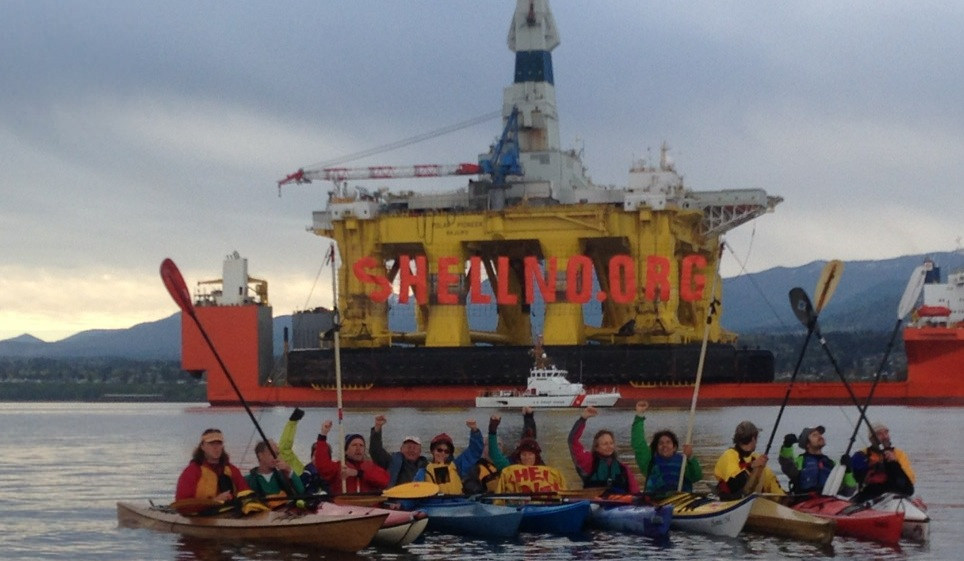It has been more than 15 years since tear gas filled the streets of Seattle and tens of thousands of people protested the meeting of the World Trade Organization, or WTO. That week of protests in late 1999 became known as “The Battle of Seattle,” as the grassroots organizers successfully blocked world leaders, government trade ministers and corporate executives from meeting to sign a global trade deal that many called deeply undemocratic, harming workers’ rights, the environment and Indigenous people globally.
A new Battle of Seattle has been raging in recent weeks, pitting a broad coalition of people against a multinational corporate behemoth, Shell Oil. Citizens and elected officials alike, concerned about Shell’s plans to drill for oil in the Arctic, swarmed the waters around Seattle, trying to block the massive oil-drilling platform, Polar Pioneer, from leaving on its journey to the Arctic. As fossil-fuel corporations intensify their exploitation of the world’s oil, protesters, as well as the Pope, are weighing in as never before about the catastrophic effects of climate change.
The Polar Pioneer arrived in Puget Sound in mid-May in preparation for its trip to the Chukchi Sea in the Arctic Ocean. Royal Dutch Shell has the vessel under contract from Transocean, the same company whose Deepwater Horizon oil rig caused the blowout and oil-spill disaster in the Gulf of Mexico five years ago. As the platform was tugged into the Port of Seattle’s Terminal 5, the first wave of the “Mosquito Fleet” paddled out to block it. The protest flotilla is made up of “kayaktivists,” people in small kayaks that establish a blockade, much like the protesters in 1999 linked arms on the rainy streets of Seattle to block the delegates attempting to attend the WTO Ministerial Conference.
To the horror of many, President Barack Obama has approved Arctic-oil exploration. Subhankar Banerjee, renowned photographer, writer and activist who has spent the past 15 years working for the conservation of the Arctic, called the Obama administration “both irresponsible and reckless.” Banerjee says, “What the administration has approved now is the exploration plans for Shell to drill this summer, starting from July to October. … Shell still needs more permits from NOAA [National Oceanic and Atmospheric Administration], Fish and Wildlife Service and other federal agencies. So that’s why the activists are working very hard to make sure that some of these permits are not granted.”
Even legendary musician Paul McCartney has weighed in. In his foreword to a new book against Arctic drilling by Greenpeace activist Ben Stewart, McCartney writes:
“As the ice retreats, the oil giants are moving in. Instead of seeing the melting as a grave warning to humanity, they are eyeing the previously inaccessible oil beneath the seabed at the top of the world. They’re exploiting the disappearance of the ice to drill for the very same fuel that caused the melting in the first place.”
Ultimately, the Polar Pioneer escaped Puget Sound. As the rig entered the open sea off the coast of Vancouver Island in Canada, Greenpeace Canada dispatched inflatable boats. Indigenous activist Audrey Siegl of the Musqueam First Nation stood on the bow of one small boat, holding her hands in a defiant order to stop. Meanwhile, two more people were swimming in the open ocean, in front of the gargantuan Shell vessel, treading water while holding a sign reading, “People vs Oil.”
Farther north, in Alaska, environmentalists, Indigenous people and fisherfolk are joining together to block a U.S. Navy training exercise called “Northern Edge.” The Navy is reportedly unleashing thousands of sailors and other military members, along with several Navy destroyers, hundreds of aircraft, extensive weaponry and a submarine for naval exercises. The Navy also has permission to expend hundreds of thousands of pounds of bombs and other munitions, polluting the waters and disrupting marine life. Truthout reporter Dahr Jamail writes, “The waters in the Gulf of Alaska are some of the most pristine in the world.” He told me on Democracy Now!:
“The city of Cordova … passed a city resolution directly opposing the naval exercises, as did the City Council of Kodiak, Alaska. … We’ve seen a over 150-boat flotilla in Cordova happened a few weeks ago … another large flotilla of fishermen out of Kodiak did the same thing.”
Just like the complex, interrelated issues of global trade brought together an unprecedented coalition in the streets of Seattle 15 years ago, so now does human-induced climate change. This threat is being met with a chorus of resistance, including Pope Francis, whose new encyclical on the environment calls for concerted action to confront global warming.
When the Pope and paddlers unite, change cannot be far off.
Denis Moynihan contributed research to this column.
Amy Goodman is the host of Democracy Now!, a daily international TV/radio news hour airing on more than 1,200 stations in North America. She is the co-author of The Silenced Majority, a New York Times bestseller.
Photo: Backbone Campaign/flickr



